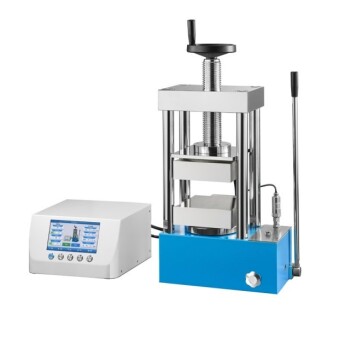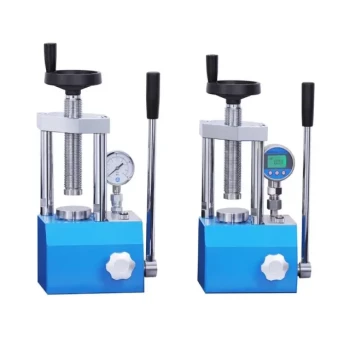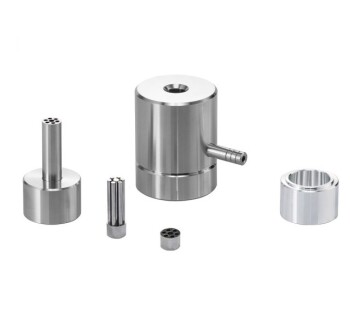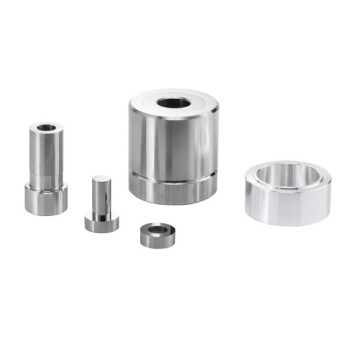At its core, a hot press is a fundamental tool for quality assurance because it uses a precise combination of intense heat and pressure to fundamentally transform a material. This process forces the material to conform to exact specifications for strength, durability, and dimensional accuracy, locking in quality at a structural level.
The true value of a hot press in quality assurance isn't just in shaping a part; it's in creating an entirely new, superior material by controlling its transformation at the molecular level, resulting in highly predictable and reliable performance.
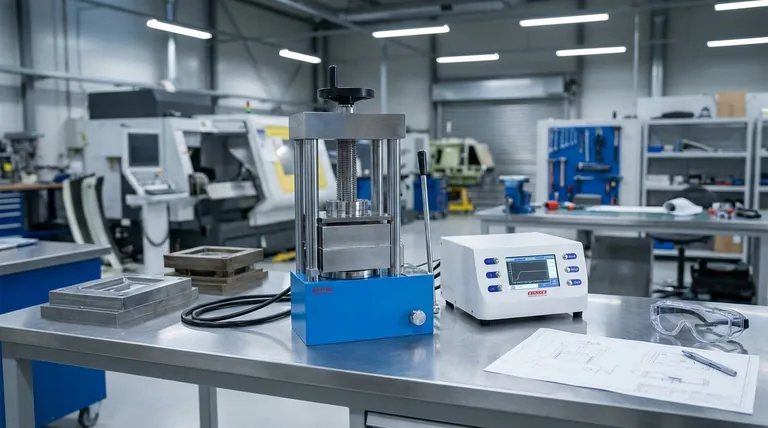
From Raw Materials to Guaranteed Performance
A hot press is more than a simple mold. It is an environment where the fundamental properties of a material are re-engineered to meet a specific quality standard.
The Principle of Controlled Transformation
The process works by applying two forces simultaneously. Heat makes the material pliable or initiates a chemical reaction (like curing a resin), while immense pressure consolidates the material, eliminates voids, and ensures uniform density.
This controlled environment forces a permanent change. It's the difference between gluing two things together and fusing them into a single, indivisible entity.
Ensuring Material Density and Strength
Many quality failures originate from internal imperfections like pores or voids. A hot press directly addresses this through a process called sintering or consolidation.
Pressure forces the material particles into intimate contact, closing any gaps. The heat then helps bond these particles together, dramatically increasing the material's final density and, as a result, its strength and durability.
Achieving Dimensional Accuracy
The platens and mold of a hot press define the final shape of the component with extreme precision.
By applying heat and pressure, the material is forced into every detail of the mold and then "cured" or set in that exact shape. This process minimizes post-process warping and ensures every part meets tight dimensional tolerances.
Key Applications in High-Stakes Industries
The ability to guarantee material properties makes hot pressing essential in sectors where failure is not an option.
Manufacturing Advanced Composites
In aerospace and high-performance automotive industries, hot presses are used to create composite parts. Reinforcing fibers (like carbon fiber) and resins are pressed together.
The heat cures the resin while the pressure eliminates any air pockets, creating a single, lightweight, and exceptionally strong component. The quality is assured because the process guarantees a perfect bond between the fibers and the matrix.
Creating High-Performance Materials
In materials science, hot pressing facilitates phase transformations and solid-phase reactions. This allows for the creation of advanced ceramics or bonded metals with specific, engineered properties.
By controlling the heat and pressure, engineers can produce materials with superior thermal stability and strength that would be impossible to create through other methods.
Understanding the Trade-offs
While powerful, the hot press process has specific constraints that must be considered for effective quality management.
Cycle Time and Throughput
Hot pressing is typically a batch process. The cycle of heating, holding under pressure, and cooling can be time-consuming, which may limit its suitability for high-volume, rapid manufacturing compared to continuous methods.
High Capital and Energy Costs
These are heavy-duty machines that require significant capital investment. Furthermore, generating the necessary high temperatures and hydraulic pressures consumes a substantial amount of energy, adding to the operational cost per part.
Material Suitability
The process is only viable for materials that can withstand high temperatures and pressures without undesirable degradation. The material's thermal properties dictate the viability of using a hot press.
Making the Right Choice for Your Goal
Integrating a hot press into your quality assurance strategy depends entirely on your end goal.
- If your primary focus is ultimate strength and low weight: A hot press is essential for creating void-free advanced composites or sintered materials where internal integrity is the top priority.
- If your primary focus is creating novel materials with unique properties: The hot press is an indispensable R&D tool, providing the control needed to engineer materials for specific thermal or structural performance.
- If your primary focus is high-volume production of simple parts: The long cycle times and high cost of hot pressing may be excessive; consider alternative methods like injection molding or stamping.
By mastering the principles of controlled transformation, you move beyond simple fabrication and begin to engineer quality into the very structure of your material.
Summary Table:
| Key Aspect | Contribution to Quality Assurance |
|---|---|
| Material Strength | Increases density and eliminates voids for enhanced durability |
| Dimensional Accuracy | Ensures tight tolerances and minimizes warping |
| Process Control | Provides precise heat and pressure for reliable transformations |
Ready to elevate your manufacturing quality with reliable hot press solutions? KINTEK specializes in lab press machines, including automatic, isostatic, and heated lab presses, designed to meet the rigorous demands of laboratories. Our equipment ensures superior material performance, precise control, and consistent results for industries like aerospace and automotive. Contact us today to discuss how we can support your quality assurance goals and boost your production efficiency!
Visual Guide

Related Products
- 24T 30T 60T Heated Hydraulic Lab Press Machine with Hot Plates for Laboratory
- Automatic High Temperature Heated Hydraulic Press Machine with Heated Plates for Lab
- Laboratory Manual Heated Hydraulic Press Machine with Hot Plates
- Heated Hydraulic Press Machine with Heated Plates for Vacuum Box Laboratory Hot Press
- Automatic Heated Hydraulic Press Machine with Hot Plates for Laboratory
People Also Ask
- Why is it necessary to use heating equipment for the dewatering of hempseed oil biodiesel? Expert Quality Guide
- What are the key technical requirements for a hot press machine? Mastering Pressure and Thermal Precision
- Why is high-precision temperature control of laboratory hydraulic press heating plates critical for wood densification?
- What is the role of a hydraulic press with heating capabilities in constructing the interface for Li/LLZO/Li symmetric cells? Enable Seamless Solid-State Battery Assembly
- How is the temperature of the hot plate controlled in a hydraulic lab press? Achieve Thermal Precision (20°C-200°C)
